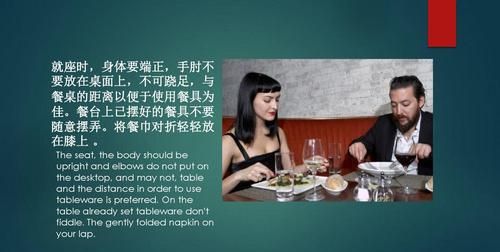本文目录
英国餐桌礼仪文化英语介绍
英国餐桌礼仪英语介绍
餐桌礼仪,这的确是不同国家不同规矩呀。英国都有哪些餐桌礼仪?下面我为大家带来英国餐桌礼仪英语介绍内容,希望大家喜欢。

英国餐桌礼仪英语介绍
Table Manners in England (UK)
The British generally pay a lot of attention to good table manners.Even young children are expected to eat properly with knife and fork.
We eat most of our food with cutlery.The foods we don't eat with a knife,fork or spoon include sandwiches,crisps,corn on the cob,and fruit.
Things you should do:
If you cannot eat a certain type of food or have some special needs,tell your host several days before the dinner party.
If you are a guest,it is polite to wait until your host starts eating or indicates you should do so.It shows consideration.
Always chew and swallow all the food in your mouth before taking more or taking a drink.
You may eat chicken and pizza with your fingers if you are at a barbecue,finger buffet or very informal setting.Otherwise always use a knife and fork.
Always say thank you when served something.It shows appreciation.
When eating rolls,break off a piece of bread before buttering.Eating it whole looks tacky.
When eating soup,tip the bowl away from you and scoop the soup up with your spoon.
When you have finished eating,and to let others know that you have,
place your knife and folk together,with the prongs (tines) on the fork facing upwards,on your plate.
In a restaurant,it is normal to pay for your food by putting your money on the plate the bill comes on.
Things you should not do:
Never lick or put your knife in your mouth.
It is impolite to start eating before everyone has been served unless your host says that you don't need to wait.
Never chew with your mouth open.No one wants to see food being chewed or hearing it being chomped on.
It is impolite to have your elbows on the table while you are eating.
Don't reach over someone's plate for something,ask for the item to be passed.
Never talk with food in your mouth.
It is impolite to put too much food in your mouth.
Never use your fingers to push food onto your spoon or fork.
It is impolite to slurp your food or eat noisily.
Never blow your nose on a napkin (serviette).Napkins are for dabbing your lips and only for that.
Never take food from your neighbours plate.
Never pick food out of your teeth with your fingernails.
Things that are ok to do:
It is ok to eat and drink something while walking down the street,unless you want to seem posh.
It is ok to pour your own drink when eating with other people,but it is more polite to offer pouring drinks to the people sitting on either side of you.
It is ok to put milk and sugar in your tea and coffee or to drink them both without either.
I am not used to eating with a knife and fork.What do I need to know?
We eat continental style,with fork in the left hand and the knife in the right (or the other way round if you are left handed).At the top of your plate will be a dessert spoon and dessert fork.
If you are eating at a formal dinner party,you will come across many knives and forks.Start with the utensils on the outside and work your way inward with each subsequent course
How to eat with a knife and fork in England
The fork is held in the left hand and the knife in the right.
If you have a knife in one hand,it is wrong to have a fork in the other with the prongs (tines) pointed up.
Hold your knife with the handle in your palm and your folk in the other hand with the prongs pointing downwards.
;用餐礼仪用英语怎么说
关于用餐的礼仪英语介绍
不同国家有不同的用餐礼仪!那么我们一起来看看吧!以下是我为您搜集整理提供到的用餐的礼仪英语内容,希望对您有所帮助!欢迎阅读参考学习!

关于用餐的`礼仪英语
Britain(英国)
Always: Eat with your fork in your left hand and knife in your right.
√左手持叉,右手持刀。
Never: Speak with your mouth full.
×说话时嘴里塞满了食物。
Denmark(丹麦)
Always: Place your fork downwards on a plate if you want seconds.
√若要添菜,可将餐叉朝下,置于盘上。
Never: Take the last item on any given plate. You must continue to halve it until only crumbs are left.
×取走盘中最后一份食物。若盘中留下一人份时,可考虑分而食之。
Japan(日本)
Always: Indulge in slurping. It is considered polite.
√吃饭大声咂吧,在日本被视为礼貌之举。
Never: Pour yourself a drink. It is tradition to pour drinks for one another.
×自己倒饮料。食客为彼此倒饮料,才符合传统习俗。
Thailand(泰国)
Always: Consider meals as a social event where only the person perceived as the riches pays.
√饭局其实是个社交场合,最有钱的那个自然会买单。
Never: Leave your chopsticks in the bowl. It symbolises death.
×将筷子插在碗中,那很不吉利。
Mexico(墨西哥)
Always: Wait for your host to say ‘Buen Provecho’ (Enjoy your meal) before eating.
√等主人说完“用餐愉快”(Buen Provecho)后,再开始吃喝。
Never: Arrive on time. Arrive 30 minutes late, if not later.
×准时赴宴。迟到30分钟以上,并不为过。
Middle East(中东)
Always: Eat your meal in silence.
√用餐时保持安静。
Never: Pass food with your left hand.
×用左手递食物。
Germany(德国)
Always: Cut as much food as possible with your fork to compliment the cook that the food is tender.
√取食时,能切多大切多大。在德国,这意在称赞厨师技艺高超,做出的料理入口即化。
Never: Cut lettuce in a salad. Fold it with a fork.
×吃沙拉时切生菜。食客不妨用餐叉叉起食用。
Mongolia(蒙古)
Always: Keep your palm facing up when holding cups.
√持杯时,手掌朝上。
Never: Spill milk or dairy products. It is considered bad luck.
×将牛奶或乳制品洒在地上。蒙古人认为,这会带来厄运。
Kenya(肯尼亚)
Always: Wash your hands before eating: a basin may be brought to the table for you.
√餐前洗手。餐桌上甚至备有洗手盆。
Never: Eat before the eldest male. He must eat first before anyone else can start.
×抢在最老的男性长辈前用餐。要知道,家中最老的男性长辈享有优先用餐权。
Chile(智利)
Always: Let the woman sit down before the men.
√邀请女士先入座。
Never: Speak with cutlery in your hands.
×手持刀叉,与他人交谈。
;英国的餐桌礼仪中英文
讲到吃的礼节,不同的国家或文化常存在着许多差异,亚洲人认为挺礼貌的举动,欧洲人见了可能感到很不文雅;中东国家餐桌上特殊的用餐礼仪,到了美国人的餐桌上使用起来就变成了粗鲁的动作了尽管有着许多不同,谨记下面的各国一些礼仪,免得出丑。
在韩国和朝鲜吃饭时不能边谈边吃,并把此作为人人应遵守的礼节,如果随便出声,极可能引起人们的反感。
埃及人在用饭时,也忌交谈,与韩国不同的是不是出于礼貌,而是出于对神的尊敬,如果不遵守就会被认为是对神的亵渎。
在斯里兰卡则更进一步、吃喝都不能出声,其中包括喝汤、渴水时也不能出声,他们甚至把此当作一条严格的禁戒。缅甸人更奇,忌禁在用餐时吹口哨或用嘴吹食物,认为这样做会把财源吹跑。
在沙特阿拉伯、也门和阿曼等国家的餐桌上,热情的主人总是不让客人的酒杯空着。表示自己喝够了的唯一办法,是将杯子拿在手中,向两边微晃,这样主人就不再斟酒了。
在保加利亚和尼泊尔,当主人请外来的客人喝饮料的时候,客人如果是点头,那就只好看人家喝。因为在这两个国家,习惯上点头是表示“不”,而摇头才表示“是”。
在英国、中东地区的一些国家,对主人提供的饮料,客人以不过三杯为宜。到韩国人家做客则要注意不能喝第四杯饮料,不能吃第四碗饭,不能一次上四个菜肴。西欧则规定不能上第十三道菜肴,不能十三个人同桌共餐。
在印度和中东一些国家,吃饭和拿接食品,只能用右手,绝对不能用左手。因为一般左手是用来洗澡,上厕所的,不洁静,所以用左手拿接食品是不礼貌的。
在匈牙利规矩就更多,如宴会忌单数,尤忌13,打碎玻璃器具是凶兆,星期五是不吉祥的日子。
与英国人一起用餐,吃饭时就忌谈生意,他们是不会加以理睬的。相反,美国人则可边吃边谈,而且还会谈得很起劲,成功率也比较高。
餐桌上的规矩也存在很大的差异,如欧美各国和地区之间,可以说是千差万别的。以刀叉用法而言,有传统的英国式,也有大为轻便的美国式,还有用手抓着吃的印度绅士。但有的普遍通用的规矩就应注意,如果餐桌上遇到自己不喜欢吃的菜,服务员从大盘中依次分给各人的菜盘上时,予以婉谢。一旦将菜接到自己的菜盘上之后,留着不吃,就不够礼貌,还犯了规矩。
在进餐期间,不要抽烟,要等到饭后喝咖啡时,可以抽烟,如有女性同席,应先问声:“可以抽烟吗?”征得同意后,才可抽烟。如邻座女士也要抽烟,应先给她点烟,自己不要先点烟,待有人点烟,自己再点。
在餐桌上祝酒,无论什么样的酒,从饮料到香槟酒等都可以用来祝酒,对别人祝酒如果自己不喝,这是非常失礼的行为。假如你确实喝不下这杯烈性酒,可把酒杯端到嘴边做一个象征性的动作。
另外,餐桌上不要看别人吃东西,这也是不礼貌的行为。在餐桌上还要注意一些规矩,如涉及个人私事,切忌问及。如年龄、工资收入、是否结婚、打扮、容貌及私生活等千万不要过问,以免犯规矩。如遇到棘手的问题,应沉着应付,态度要自然,大方。假如你陷入某种尴尬境地,需要保持冷静,要机智地使自己能顺利解围,不失尊严。

各国餐桌礼仪英语
关于各国餐桌礼仪英语
每个国家在餐桌上都有哪些礼仪呢?下面由我为大家整理的各国餐桌礼仪英语,欢迎大家查看!

Britain
英国
Always: Eat with your fork in your left hand and knife in your right.
√左手持叉,右手持刀。
Never: Speak with your mouth full.
×说话时嘴里塞满了食物。
Denmark
丹麦
Always: Place your fork downwards on a plate if you want seconds.
√若要添菜,可将餐叉朝下,置于盘上。
Never: Take the last item on any given plate. You must continue to halve it until only crumbs are left.
×取走盘中最后一份食物。若盘中留下一人份时,可考虑分而食之。
Japan
日本
Always: Indulge in slurping. It is considered polite.
√吃饭大声咂吧,在日本被视为礼貌之举。
Never: Pour yourself a drink. It is tradition to pour drinks for one another.
×自己倒饮料。食客为彼此倒饮料,才符合传统习俗。
Thailand
泰国
Always: Consider meals as a social event where only the person perceived as the riches pays.
√饭局其实是个社交场合,最有钱的那个自然会买单。
Never: Leave your chopsticks in the bowl. It symbolises death.
×将筷子插在碗中,那很不吉利。
Mexico
墨西哥
Always: Wait for your host to say ‘Buen Provecho’ (Enjoy your meal) before eating.
√等主人说完“用餐愉快”(Buen Provecho)后,再开始吃喝。
Never: Arrive on time. Arrive 30 minutes late, if not later.
×准时赴宴。迟到30分钟以上,并不为过。
Middle East
中东
Always: Eat your meal in silence.
√用餐时保持安静。
Never: Pass food with your left hand.
×用左手递食物。
Germany
德国
Always: Cut as much food as possible with your fork to compliment the cook that the food is tender.
√取食时,能切多大切多大。在德国,这意在称赞厨师技艺高超,做出的料理入口即化。
Never: Cut lettuce in a salad. Fold it with a fork.
×吃沙拉时切生菜。食客不妨用餐叉叉起食用。
Mongolia
蒙古
Always: Keep your palm facing up when holding cups.
√持杯时,手掌朝上。
Never: Spill milk or dairy products. It is considered bad luck.
×将牛奶或乳制品洒在地上。蒙古人认为,这会带来厄运。
Kenya
肯尼亚
Always: Wash your hands before eating: a basin may be brought to the table for you.
√餐前洗手。餐桌上甚至备有洗手盆。
Never: Eat before the eldest male. He must eat first before anyone else can start.
×抢在最老的男性长辈前用餐。要知道,家中最老的'男性长辈享有优先用餐权。
Chile
智利
Always: Let the woman sit down before the men.
√邀请女士先入座。
Never: Speak with cutlery in your hands.
×手持刀叉,与他人交谈。
以上就是关于英国人的餐桌礼仪英语,英国餐桌礼仪文化英语介绍的全部内容,以及英国人的餐桌礼仪英语 的相关内容,希望能够帮到您。

